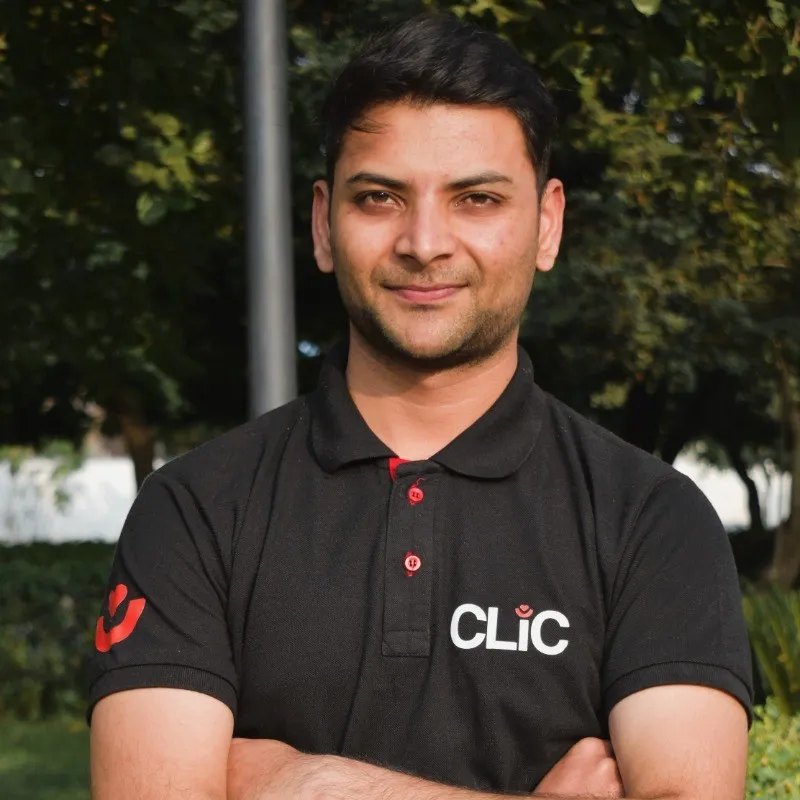This social startup is ensuring care and support to children leaving orphanages and care homes after 18
Careleavers Inner Circle Forum (CLiC), started by Girish Mehta, is a non-profit startup that helps children leaving child care institutions at the age of 18 integrate into mainstream society.
At the age of eight, Girish Mehta lost his father. Unable to take care of him, his mother sent him to his uncle in Mumbai so that he could attend school.
However, his uncle put him to work in his restaurant. When his mother saw her child’s plight, she brought him back to Rajasthan, and at the age of 12, she enrolled him in a child care institution. Mehta lived in two homes in Jaipur till he turned 18, pursuing his education and living with a group of children who were orphaned, abandoned, or those whose parents couldn’t look after them.

Anisha Sharma
“In 2018, a month before I left the home, they asked me what my plans were. I had done a short course in hotel management after finishing school, but had no clue about the outside world. I was distanced from my mother and was used to living in a group,” Mehta recalls.
He joined the thousands of care leavers who leave Child Care Institutions (CCIs) and other alternative care centres every year, confused, worried and uncertain about their future.
Children who are compelled to leave their orphanages post turning 18 years of age (as per government rule) are called care leavers.
Mehta’s experiences as a care leaver paved the way for him to start CLiC–Care Leavers Inner Circle Forum in 2021. It is a non-profit startup that aims to support and care leavers by hand holding them in the process of starting life anew.
Life outside a care home

Girish Mehta
After leaving his institution at the age of 18, Mehta remembers feeling the mental pressure of leaving the confines of a secure home. He heard of a job at a child helpline run by an NGO and applied.
“They gave me the job and also accommodation with the condition that I also handle calls during the night,” he adds.
During the course of this work, he came in contact with a number of care leavers in Jaipur, many of whom found it difficult to cope with the idea of leaving their homes and took on jobs as wardens in the same places.
He started a small WhatsApp group as an informal network to help care leavers in need of accommodation or help. When Mehta switched jobs and started working with the Josh community, they guided him in his efforts and also provided jobs to a few care leavers.
Building a community of care leavers
When Mehta realised that the problem could not be tackled with just a few jobs, he decided to start CLiC as a social impact startup. He approached the United Nations Children’s Fund (UNICEF), which offered support to build a database of care leavers and their conditions in Rajasthan.
“For this, we organised a video shoot where we invited care leavers and around 60 people turned up. We understood first-hand their challenges and what needed to be done,” he says.
Impressed by his efforts, UNICEF agreed to support him. In addition, Mehta also received permission from the Government of Rajasthan to visit orphanages in the state to build the database.
Present at the event was Anisha Sharma, who later joined Mehta as the co-founder of CLiC. Sharma’s story was similar but she and her brother were left at a care home as orphans.
“At the age of 18, I was doing a nursery teacher’s training course when I had to leave. Since I had no money to pay the remainder of the fees, I had to drop out,” she says.
Once out into the world with her brother, Sharma had to knock on many doors to even get a place to stay. There was no support or guidance on what to do.
While hunting for a room, Sharma came across her childhood caretaker who recognised her and found them a place. She started taking up teaching jobs, and her brother, only 17 but already a computer wiz who took up graphic designing. Together, they scraped together the Rs 9,000 they needed to run their home.
In a few years, Sharma moved to call centres, and then marketing jobs in which she excelled and started earning more. As a woman, she found it even more difficult and had to often lie that she had parents so that people wouldn’t take advantage of her naivety or cluelessness.
“During this time, I was approached by other care leavers who were in the same predicament as I had been. I understood that though there were organisations working for this, there was little awareness on problems faced by care leavers,” Sharma says. Impressed by Mehta’s work, she decided to move to Jaipur and work with CLiC.
Mehta adds that this lack of awareness often leads children into crime and abuse, with some girls even forced into marriage.
Usha spent her childhood in a child care institution (CCC). When she had to leave, she was scared about her future.
“I decided to get married but didn’t know how to get along with my husband or mother-in-law, or to follow customs or rituals. I felt suffocated in the marriage, and when it ended, I had to face the world alone,” she says.
During this time, she met a group of care leavers from CLiC who counselled her and helped her find a job at a bookstore in Jaipur.
“Initially, I was very confused in my job and was not sure I would manage everything,” she says. With the support of her boss and surrounded by books, Usha says she has come into her own.
The need to implement an after-care model
CLiC has worked with 1,500 care leavers in eight states—Telangana, Delhi, Rajasthan, Gujarat, and Madhya Pradesh. CLiC works with a team of 11 with five core members.
Started in 2021, it offers a range of services that include legal guidance related to housing, employment and other issues, financial guidance regarding access to resources, peer support via a buddy system, information about government policies and help with documentation and job opportunities. It also offers mental health counselling.
CLiC offers a care leavers kit during an after-care ceremony held at homes and orphanages. The kit consists of essentials and a guidebook that will help them understand and cope with what’s in store once they leave the home. A one-time amount of Rs 5,500 is also offered for medical and other emergencies.
Discussions with former Women and Child Development Minister, Smriti Irani, and later, with Joint Secretary Indra Mallo, led to the issuance of an order under Mission Vatsalya. States and union territories were asked to facilitate and ensure a verified database, identity proof, temporary shelters, completion of education, among others.
“Despite this order and an aftercare model, there is little execution. There is no action at the ground level, without which these cannot be implemented,” says Sharma.
Together with its slew of measures ensuring a transition after care leavers turn 18, CLiC is using technology to ensure a permanent database and support.
“Care leavers can now register on our portal. Once they are verified, they are given a membership ID and they can seek help for different needs like documentation, skilling, and others,” says Mehta.
The organisation works with corporate partners and individual donors to raise funds for different aspects of the process. The care leavers are supported until they turn 30 years old.
CLiC is registered at Starup India and is incubated at The/Nudge and MNIT Jaipur, which has offered them office space on its premises. Recently, it was featured in the SDG Entrepreneurs of India coffee table book released by Niti Aayog.
“The problem of integrated care leavers into mainstream society is a big one. Our model is scalable and we are looking for support from state governments and effective policies to take it pan-India and help thousands of care leavers,” says Mehta.
Edited by Megha Reddy






